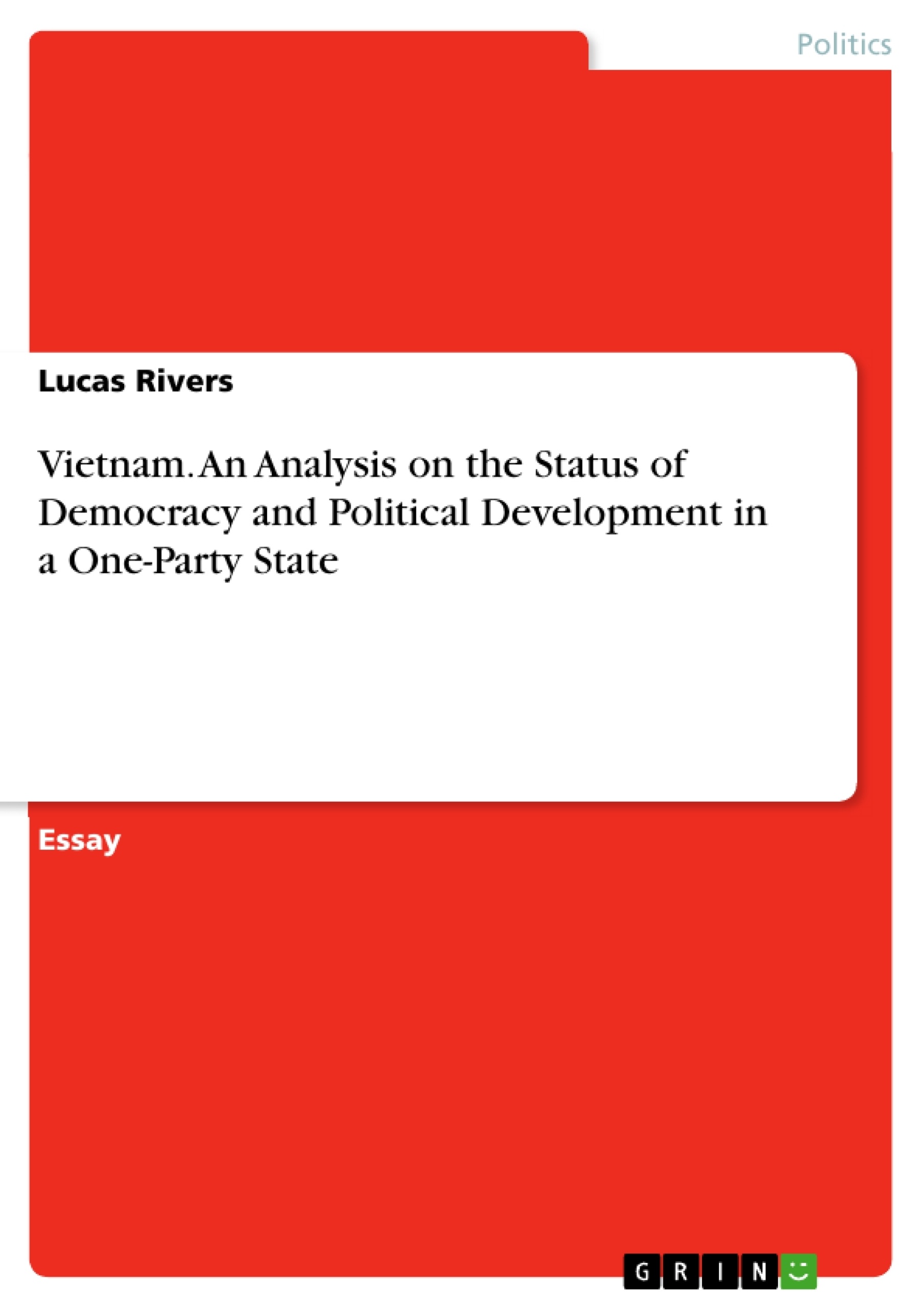Vietnam is one of the fastest growing economies in the world. Over the past 30 years, Vietnam has transformed itself from one of the world’s poorest nations to a lower-middle income country ripe with investment opportunities. Yet despite these economic achievements, this one-party state still encounters significant obstacles to sustained and democratic political development in each of the USAID’s five key elements of democracy, human rights and governance: consensus, inclusion, competition and political accountability, rule of law and human rights, and government responsiveness and effectiveness.
Table of Contents
- Introduction
- Vietnam in Context
- Colonialism, Conflict, & Communism: An Historical Perspective
- Reform, Recovery, & "Renovation": A Current Perspective
Objectives and Key Themes
This paper analyzes the status of democracy and political development in Vietnam, a rapidly growing one-party state. It examines the interplay between Vietnam's economic achievements and its persistent challenges in achieving democratic progress. The analysis considers Vietnam's historical context, its economic reforms, and the current political landscape to understand the complexities of its political development.
- The impact of Vietnam's historical context on its current political system.
- The role of economic reforms ("Đổi Mới") in Vietnam's development.
- The challenges to democratic development within a one-party state.
- The concentration of power and concerns regarding "strongman tendencies."
- The balance between economic growth and political liberalization.
Chapter Summaries
Introduction: This introductory section sets the stage for the analysis by highlighting Vietnam's remarkable economic growth while acknowledging the persistent obstacles to democratic political development within its one-party system. It introduces the five key elements of democracy emphasized by USAID: consensus, inclusion, competition and political accountability, rule of law and human rights, and government responsiveness and effectiveness, which serve as a framework for the subsequent analysis.
Vietnam in Context: Colonialism, Conflict, & Communism: An Historical Perspective: This chapter delves into Vietnam's rich and complex history, tracing its journey from centuries of Chinese rule to French colonialism. It highlights the impact of these colonial experiences on Vietnamese culture, education, and law. The chapter details the rise of Vietnamese nationalism and communism, culminating in the formation of the Vietnamese Communist Party and the subsequent wars for independence against France and the United States. The narrative emphasizes how historical events shaped the current political system, the legacy of conflict, and the enduring influence of communist ideology.
Vietnam in Context: Reform, Recovery, & "Renovation": A Current Perspective: This chapter focuses on Vietnam's economic reforms, known as "Đổi Mới," initiated in 1986. It explains the shift from a centrally planned socialist economy to a market-oriented socialist economy, the significant economic growth that followed, and the role of international relations (particularly with the US and China) in fueling this growth. The chapter also discusses the increasing income inequality and corruption issues that accompanied this rapid economic development, and the recent political consolidation of power under General Secretary Nguyễn Phú Trọng.
Keywords
Vietnam, one-party state, political development, economic development, Đổi Mới, democracy, human rights, communism, colonialism, corruption, Nguyễn Phú Trọng, economic reforms, political consolidation, international relations.
Frequently Asked Questions: A Comprehensive Language Preview of Vietnam's Political and Economic Development
What is the purpose of this document?
This document provides a comprehensive overview of Vietnam's political and economic development. It includes a table of contents, objectives and key themes, chapter summaries, and keywords, serving as a preview of a larger academic analysis of the subject.
What are the key themes explored in this document?
The document analyzes the interplay between Vietnam's economic achievements and its challenges in achieving democratic progress. Key themes include the impact of Vietnam's historical context (colonialism, communism, war), the role of economic reforms ("Đổi Mới"), challenges to democratic development within a one-party state, power concentration, the balance between economic growth and political liberalization, and the role of key figures like General Secretary Nguyễn Phú Trọng.
What historical context is considered?
The document examines Vietnam's history, including centuries of Chinese rule, French colonialism, the rise of Vietnamese nationalism and communism, and the wars for independence. It emphasizes how these events shaped the current political system and the enduring influence of communist ideology.
What is the significance of "Đổi Mới"?
"Đổi Mới" (Renovation) refers to Vietnam's economic reforms initiated in 1986, shifting from a centrally planned socialist economy to a market-oriented one. The document explores the significant economic growth that resulted, the role of international relations, and the accompanying issues like income inequality and corruption.
What are the main challenges to democratic development in Vietnam?
The document highlights the challenges of achieving democratic development within a one-party state. It discusses concerns about the concentration of power, "strongman tendencies," and the balance between economic growth and political liberalization. The five key elements of democracy emphasized by USAID (consensus, inclusion, competition and political accountability, rule of law and human rights, and government responsiveness and effectiveness) serve as a framework for analyzing these challenges.
What are the key chapters covered in this preview?
The preview includes an introduction, a section on Vietnam's historical context (divided into colonialism/conflict/communism and the "Đổi Mới" reforms), and a chapter summarizing the key themes and findings.
Who is Nguyễn Phú Trọng, and what is his significance?
Nguyễn Phú Trọng is the General Secretary of the Communist Party of Vietnam. The document mentions his role in the recent political consolidation of power.
What are some key words associated with this analysis?
Keywords include Vietnam, one-party state, political development, economic development, Đổi Mới, democracy, human rights, communism, colonialism, corruption, Nguyễn Phú Trọng, economic reforms, political consolidation, and international relations.
For whom is this document intended?
This document is intended for academic use, supporting the analysis of themes related to Vietnam's political and economic development in a structured and professional manner.
- Quote paper
- Lucas Rivers (Author), 2018, Vietnam. An Analysis on the Status of Democracy and Political Development in a One-Party State, Munich, GRIN Verlag, https://www.grin.com/document/917889



